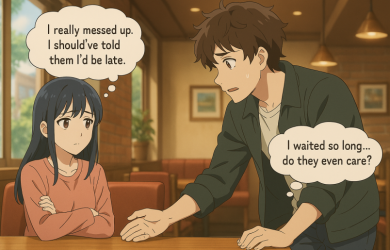How to Apologize to Someone You’ve Hurt Deeply: 10 Ways

Heal & Grow Daily for a Happier Relationship
Subscribe FREEKey Takeaways
Marriage.com AI Quick Summary
Imagine a friend confiding in you about a painful experience, only to realize later that your words unintentionally caused them more hurt. In such moments, understanding how to apologize to someone you’ve hurt deeply becomes crucial.
An effective apology can bridge the gap created by misunderstandings and offenses, restoring trust and healing wounds. It’s not just about saying “I’m sorry”; it requires genuine acknowledgment of the pain caused and a commitment to change.
This article explores the nuances of sincere apologies, illustrating their importance and the consequences of neglecting them. By recognizing the significance of a heartfelt apology, we can foster stronger relationships and navigate the complexities of our interactions with empathy and understanding.
What is an apology?
An apology is an expression of regret for something you’ve done wrong or that has caused someone harm. It acknowledges responsibility for your actions and the impact they had on another person.
A sincere apology conveys remorse and a desire to repair any damage caused. It often includes an explanation of what happened and a commitment to avoid similar behavior in the future.
While learning how to apologize to someone you’ve hurt deeply, don’t erase the past as it is an important step towards forgiveness, reconciliation, and rebuilding trust.
Why sincerely apologizing is important?
Apologizing is a crucial aspect of maintaining healthy relationships. Whether it’s a minor mistake or a significant offense, acknowledging the impact of your actions can foster understanding and healing.
Research shows there is an emotional element to the pain that one may experience. And apologizing can lessen this pain for someone.
This section explores the essential reasons why you should apologize for hurting someone, emphasizing the importance of sincerity and accountability in rebuilding trust and connection.
-
Restores trust in relationships
Trust is a fundamental pillar of any relationship, whether personal or professional. When you hurt someone, it can shatter that trust, leading to doubts and insecurities. A sincere apology acknowledges the breach of trust and expresses a commitment to rebuilding it.
By taking responsibility for your actions, you send a clear message that you value the relationship and are willing to work towards regaining that trust.
-
Promotes healing and emotional well-being
Both the person who has been hurt and the one who caused the harm can experience emotional turmoil. The offended party may feel hurt, angry, or betrayed, while the offender may grapple with guilt or regret.
A heartfelt apology serves as a vital step in the healing process. It provides the opportunity for the hurt individual to express their feelings and begin the journey toward emotional recovery, allowing for both parties to move forward more positively.
-
Encourages personal growth and self-awareness
Apologizing is not just about the other person; it can also be a profound experience for the one making the apology.
Taking the time to reflect on your actions and their impact encourages self-awareness and personal growth. It forces you to confront your mistakes and understand how they affect others, which can lead to improved behavior and decision-making in the future. This process fosters emotional intelligence and can ultimately make you a better person and friend.
-
Strengthens interpersonal connections
When you apologize sincerely, it demonstrates empathy and understanding. Acknowledging your mistakes can deepen your connection with the other person, fostering a sense of intimacy and respect. Apologizing opens the door to honest communication and vulnerability, allowing both parties to express their feelings. This shared experience can strengthen the bond, making the relationship more resilient and authentic.
-
Sets a positive example for others
By demonstrating accountability through your apologies, you set a standard for others to follow. It encourages a culture of honesty and openness within your social circles or workplace.
When others see you taking responsibility for your actions, they may feel empowered to do the same. This ripple effect can lead to healthier communication patterns and more meaningful relationships within your community.
-
Prevents future conflicts
Addressing the issue through an apology can help prevent similar conflicts in the future. It opens a dialogue about the underlying issues that may have contributed to the offense, allowing for a deeper understanding of each other’s perspectives and needs.
This proactive approach can help both parties navigate potential misunderstandings more effectively, reducing the likelihood of future hurt.
What are the consequences of not apologizing?
An apology is a critical component of healing in any relationship. When someone is hurt and an apology is withheld, it can lead to several negative consequences that can severely affect the emotional health of both individuals involved.
Understanding these consequences is essential for fostering healthy connections and navigating interpersonal relationships effectively.
1. Resentment builds
When a person feels wronged and does not receive an apology, resentment can accumulate over time. This unresolved anger can lead to a toxic atmosphere in the relationship, making it difficult to interact positively.
The offended party may start to withdraw emotionally, leading to a lack of trust and affection. This ongoing resentment can manifest in passive-aggressive behaviors or outbursts, further straining the relationship.
2. Loss of trust
Trust is a cornerstone of any healthy relationship. When an apology is withheld, it can signal to the offended person that their feelings are unimportant or that the offender is not accountable for their actions. This loss of trust can create barriers, making it difficult for both parties to communicate openly.
Rebuilding trust takes time and effort, and without an apology, the foundation of the relationship may become fragile, leading to further misunderstandings and conflicts.
3. Emotional distress
Not apologizing can lead to emotional turmoil for both the offender and the offended. The person who was hurt may feel invalidated or dismissed, leading to feelings of sadness, anger, or loneliness.
On the other hand, the offender might experience guilt and anxiety, knowing that their actions have caused pain but feeling unable to address it. This emotional distress can affect not only the individuals involved but also their interactions with others, leading to broader impacts on their mental health and relationships.
4. Communication breakdown
When an apology is not offered, it can create a communication rift between the two parties. The offended person may feel reluctant to express their feelings, fearing that their concerns will be ignored or minimized.
This breakdown in communication can prevent both parties from discussing their emotions or resolving issues, leading to misunderstandings and unresolved conflicts. Over time, this lack of communication can erode the relationship further, making it increasingly difficult to reconnect.
5. Potential relationship end
In severe cases, the absence of an apology may lead to the end of a relationship. If the offended person feels that their pain is not acknowledged or valued, they may choose to distance themselves or cut ties altogether. This can happen in friendships, romantic relationships, or even family connections.
The decision to end a relationship can be painful, but for some, it may seem like the only option to preserve their emotional well-being.
Understanding what to do when you hurt someone you love is crucial to prevent such outcomes. The loss of a relationship not only affects those directly involved but can also have ripple effects on mutual friends and family members, leading to further complications.
Why is it so hard to apologize?
Studies show that apologizing can be difficult for some people, which might delay the healing process.
Apologies are difficult because the person you may have hurt may not communicate this to you comfortably. You may have trouble knowing and understanding what might have hurt them. Knowing that there is a need to apologize is, in itself, complicated.
Even after you know that you need to apologize to someone, apologizing may not be easy. You might feel unsure if there is even a need to apologize.
Some people may feel embarrassed or ashamed of their words and actions and may find it difficult to face someone they have hurt. If you are one of them, you can consider writing an apology letter to someone you’ve hurt.
How to apologize to someone you’ve hurt deeply: 10 tips
If you have hurt someone, you must wonder how to apologize to someone you’ve loved deeply. An apology can go a long way and save relationships.
1. Never say, ‘I put myself in your shoe.’
Wondering what to say to someone you’ve hurt? One of the common mistakes that most people commit while apologizing is when they use ‘If I put myself in your shoe/place.’
Honestly, this looks better in a Reel than in real life.
You can’t feel the pain or discomfort the person is going through. It’s all a dramatic line that should be avoided as much as possible during apologizing. So, avoid saying this phrase if you don’t want to upset your loved ones.
2. Acknowledging your mistake
How to get someone to forgive you for hurting them?
Why apologize until you’re unsure what you did to hurt someone you love?
The entire foundation of saying sorry is based on the fact that you acknowledge your mistake. Unless you’re unsure what mistake you’ve committed, there is no point in apologizing. So, make sure you’re well aware of your mistakes and ready to acknowledge them.
3. Make this right, along with saying sorry
Wondering how to apologize when you hurt someone you love?
Along with apologizing and saying that you’re sorry, you should also suggest something to make it up to them.
Sometimes the damage is such that you must do something to forgive yourself for your mistake. So, while apologizing, be prepared to offer them something to uplift their mood.
4. There is no place for ‘but’ while apologizing
Do you want to learn how to apologize for hurting someone you love?
We understand that you want to know ways to apologize to someone you’ve hurt, but the placement of ‘but’ changes the entire meaning of the sentence, right?
This is what happens when you’re apologizing to someone. You’re asking for forgiveness because you’ve hurt your loved one. Forgiveness is more than saying sorry. When you do so, there is no space for ‘but.’
The moment you use ‘but’ in your sentence conveys that you’re not truly sorry and are trying to defend yourself for your actions. So, avoid the ‘but.’
5. Take complete responsibility for your action
You have committed the mistake; no one else has done it on behalf of you. Simply saying, “I’m sorry for hurting your feelings,” can go a long way.
So while apologizing, make sure that you take complete responsibility for your actions. What is the best way to apologize to someone you hurt?
Don’t try to pass on the responsibility to someone else or involve them in your mistake. You want to sound like a grown-up person who is responsible for their actions.
So, be one and take responsibility.
6. Promise that you won’t repeat it
When you’re saying sorry or apologizing to someone you’ve hurt, you’re giving an assurance that you won’t repeat it.
So, along with saying sorry, make sure you express this as well. This assurance shows that you care about your partner and don’t want to hurt them by repeating the same mistake.
7. Be authentic while apologizing
People can make out when you’re sorry about something, or you’re just saying it for the sake of it.
While apologizing, you must sound like you’re sorry for what happened. Unless you’re apologetic about it, nothing can work.
The feeling will come only when you’ve acknowledged your mistake and taken complete responsibility for your action.
When you are authentic, apologizing gets easy, and you can expect early forgiveness.
8. Don’t make excuses
As said above, when you’re using ‘but’ while apologizing, you defend yourself.
Likewise, when you use any excuse, you’re trying to say that it’s not entirely your fault and you’re not sorry for what you’ve done. This isn’t the right way of apologizing and might take things to a different new level.
You surely don’t want to escalate things like this when you are trying to learn how to say sorry to someone you’ve hurt. So, never use excuses when you mean to deeply apologize.
9. Never expect immediate forgiveness
Most people think of immediate forgiveness while apologizing. Well, it’s right, and you should never expect it.
After apologizing, give them their space to come out of it. They were hurt, and it would take time to recover from that pain.
Expecting immediate forgiveness shows you don’t respect their emotions; you only care about yourself. If you’ve apologized correctly, they will forgive you. It’s just a matter of time.
You must know how to apologize to someone you’ve hurt deeply so they can forgive you truly. Listed above are some points that will help you seek forgiveness and will bring you both close to each other again.
Mistakes happen, but acknowledging and apologizing shows how much that person matters to you.
Watch this video to learn more about the three steps for the perfect apology:
10. Explain what you have learned from this experience
While apologizing, if you tell the person what you have done wrong and what you have learned from this experience, it might make them feel that you are sorry.
Tell them how this has helped you understand things deeply and what you would like to do the next time differently. You can consider couples counseling to help with this task.
Licensed psychologist and certified coach Silvana Mici says
A meaningful apology involves making amends and committing to change. Outline concrete steps you will take to rectify the situation and demonstrate your commitment to growth.
How to promise it won’t happen again
When you make a mistake, the ultimate goal of apologizing is to ensure you do not repeat it. While you can tell the person you have hurt verbally that it will not happen again, they might need a promise from you.
You can promise them that it will never happen again by making up to them with your actions. You need to understand that if they are hurt by something you have done or said, they may need time to trust you again.
Related Reading: 50 Romantic Promises For Your Girlfriend
Bottom line
If you’ve hurt someone, don’t hesitate to take action and learn how to apologize to someone you hurt deeply. A sincere apology can be a transformative step in repairing relationships and fostering emotional healing. It requires courage, humility, and a genuine desire to make things right.
Silvana Mici adds,
Offering a sincere apology to someone you’ve deeply hurt requires humility, empathy, and a genuine commitment to repair the relationship. By taking responsibility, listening with empathy, and demonstrating a willingness to change, you can begin the process of healing and rebuilding trust.
Remember that an effective apology goes beyond mere words; it’s about acknowledging your impact, taking responsibility, and committing to change. By implementing the thirteen sincere methods discussed, you can pave the way for reconciliation and growth.
Don’t wait for the other person to approach you—initiate the conversation and show them that you care. A heartfelt apology can be the first step toward rebuilding trust and deepening your connection.
Want a healthier, happier relationship - one step at a time?
 Tips
Tips
Write your tip or submit a video tip
All tips are reviewed before the publishing.
Share this article on
Recent Articles
Related Quizzes
Heal & Grow Daily for a Happier, Healthier Relationship
Subscribe FREE on YouTube We'd love your feedback!
We'd love your feedback!
 Expert Q&A
Expert Q&A
Ask your question related to this topic & get the support you deserve from experts.





















 Thanks for your feedback!
Thanks for your feedback!